Review of GRB 250129A¶
Team involved¶
Review Period: 2025-02-15 -- now
PWT: D. Akl
GRANDMA chair M. Pillas
Reviewer(s): S. Antier
Photmetry Expert: S. Karpov
Overview¶
This review follows the official GRANDMA best practices to ensure the photometric and spectroscopic consistency.
Skyportal page associated to the project:source/2025aji
Skyportal¶
- [ ] Name: 2025aji
- ✔ Coordinates validated at the top
- ✔ Grandma group source
- ✔ Summary valid
- ✔ T0
- ✔ Redshift updated
- ✔ Light curve cleaned
Optical photometry¶
| Filter | Telescope | #images | Consistency checked? | Keep useful data products | Extinction? | SkyPortal ready? | Comments |
| uvot::uvw1 | UVOT | 5 | ✔ | ✔ | NA | ✔ | Mona points: Turned into one as upper limit |
| uvot::uvw | UVOT | 1 | ✔ | ✔ | NA | ✔ | One upper limit from Sam Oates |
| uvot::uvm2 | UVOT | 1 | ✔ | ✔ | NA | ✔ | One upper limit from Sam Oates |
| uvot::v | UVOT | 6 | ✔ | ✔ | NA | ✔ | From Mona stacked frames |
| uvot::b | UVOT | 8 | ✔ | ✔ | NA | ✔ | All Mona: Analysis consistent with Sam |
| uvot::u | UVOT | 7 | ✔ | ✔ | NA | ✔ | 6 of Mona + one of Sam Oates |
| uvot::white | UVOT | 12 | ✔ | ✔ | ? | ✔ | One upper limit at the end + All Mona points |
| B | Skynet PROMPT-5 and PROMPT-6 | 17 | ✔ | ✔ | ✔ | ✔ | Done |
| g | TNOT,KNC,NAO-2m,KAO,Artemis,Picdumidi,C2PU | 18 | ✔ | ✔ | ✔ | No as YAHPT must be registered | Note a drop at late time. |
| V | Skynet | 33 | ✔ | ✔ | ✔ | ✔ | Removed amateur points: Not compatible with Skynet due to different detector used |
| R | TAROT,FRAM-Auger,KAIT,KNC,AbAO-T70,Euler,Skynet | 163 | ✔ | ✔ | ✔ | ✔ | Some data were removed to keep > 30 min post first day except for the fast flare of KAIT |
| r | Mistral,TNOT, KAO, NAO,Artemis,PicDuMidi,COLIBRI,KNC | 35 | ✔ | ✔ | ✔ | ✔ | Removed non det. C2PU images are too noisy |
| i | Mistral,KAO,KNC,Euler,NAO,C2PU | 11 | ✔ | ✔ | ✔ | ✔ | -- |
| I | Skynet,KNC | 10 | ✔ | ✔ | ✔ | ✔ | Sparse LC but looks consistent. Two KNC points are not from the same telescope |
| z | Artemis | 2 | ✔ | ✔ | ✔ | ✔ | Removed KAO data as not useful |
| J | PicDuMidi | 1 | NA | NA | NA | NA | This data point was not used in the offline analysis as it only included one upper limit. |
Validation tasks
| Filter | Telescope | tstart | tend | all-img analyzed ? | Data upld in SP/annotated | Consistency-checked across instr? | SkyPortal page finalized ? | Comments |
| B | Skynet-PROMPT-5 and 6 | ? | ? | 17 | ✔ | version, "Dahlia_corrected" | ✔ | didn't check tstart/tstop |
| g | TNOT | ? | ? | 1 | ✔ | ✔ | ✔ | RAS |
| KAO | ? | ? | 1 | ✔ | ✔ | ✔ | RAS | |
| KNC-hellot/Freeberg/T_CAT | ? | ? | 11 | ✔ | ✔ | ✔ | RAS | |
| NAO-2m | ? | ? | 1 | ✔ | ✔ | ✔ | ok | |
| YAPT/AST-3 | ? | ? | 1 | ✔ | ✔ | ✔ | RAS | |
| Artemis | ? | ? | 2 | ✔ | ✔ | ✔ | we performed 2 lot of stacked for the first day and it was the same photometry | |
| PicDuMidi-T1M | ? | ? | 1 | ✔ | ✔ | ✔ | yes after correction of sergey | |
| C2PU | ? | ? | 1 | ✔ | ✔ | ✔ | correction from flat and dark | |
| V | Skynet-PROMPT-5-6 | T | T | 33 | ✔ | ✔ | ✔ | S. Antier didn't have access to the images but Dahlia applied the same metholodogy as R-band of skynet |
| r | OHP/MISTRAL | T | T | 2 | ✔ | ✔ | ✔ | consistent with analysis from Adami, bad subtraction on 4083: gain close to 0 |
| TNOT | T | T | 1 | ✔ | ✔ | ✔ | removed 2 non detection | |
| KAO | T | T | 1 | ✔ | ✔ | ✔ | in agreement with TNO, include error bar to 0.05 | |
| KNC-AITP/TCAT | T | T | 4 | ✔ | ✔ | ✔ | in agreement with other wavelength + colobri, upper limit not taken into account | |
| NAO-1.5 | T | T | 1 | very different soustraction and not but it follows the flow | ||||
| Artemis | T | T | 2 | ✔ | ✔ | ✔ | ok | |
| PicDuMidi-T1M | T | T | 2 | ✔ | ✔ | ✔ | ok | |
| COLIBRI | T | T | 22 | ✔ | ✔ | ✔ | checked with Francesco analysis | |
| R | TAROT/TCH | T | T | 50 | ✔ | ✔ | ✔ | taken in clear |
| FRAM-Auger | T | T | 9 | ✔ | ✔ | ✔ | two points not very consistent but sergey said it is fine | |
| KAIT | T | T | 39 | ✔ | ✔ | ✔ | done by sergey, taken in clear | |
| KNC (3 tel) | T | T ✔ | ✔ | ✔ | I removed one data that was very close to a SKynet point | |||
| AbAO-T70 | T | T | 2 | ✔ | ✔ | ✔ | Own template to be added to correct from the pixel | |
| Euler | T | T | 5 | ✔ | ✔ | ✔ | one marginal at the end but ok | |
| Skynet | T | T | 60 | ✔ | ✔ | ✔ | 5 different telescopes in agreement with TCH | |
| i | OHP/MISTRAL | ? | ? | 1 | ✔ | ✔ | ✔ | consistent with independant measurement of OHP |
| KAO | ? | ? | 1 | ✔ | ✔ | ✔ | ||
| KNC-AITP | ? | ? | 2 | ✔ | ✔ | ✔ | removed one data as it was too close to the previous measurements | |
| Euler | ? | ? | 5 | ✔ | ✔ | ✔ | 1 upper limit valid, sometimes i moved up the value to have consistency between force and substracted force | |
| C2PU | ? | ? | 1 | ✔ | ✔ | ✔ | correction from flat and dark | |
| NAO-2m | ? | ? | 1 | Not sure | ✔ | ✔ | consistent but hard due to nonseparation between the source and the near-by star | |
| I | KNC-Montarrenti/AKO | T | T | 2 | ✔ | ✔ | trend is consistent with flares | |
| Skynet-PROMPT-2-6 | T | T | 8 | ✔ | ✔ | trend is consistent with bessellR | ||
| z | Artemis | 6.009 | 7.039 | 2 | ✔ | ✔ | ✔ | - |
| J | PicDuMidi-T1M (à confirmer) | 6.994 | 7.885 |
Images Per Band¶
Note: A special C2PU review is done here: https://docs.google.com/document/d/12fNWyKMmiDHxmjes_h9ddtvt1x767CuLUr4AOapwdBk/edit?usp=sharing. We exclude r-band and z-band. Images are not reduced with bias and dark
SDSS-g¶
Calibration:
- Catalog: Pan-STARRS DR1
- Magnitude System: Vega
Checks:
- [x] Target visible
- [x] PSF round
- [x] No stacking issues
- [x] SNR acceptable: 4 to 37
- [x] Color term applied: Yes, but not too many
- [x] Force photometry: Only
- [x] Template subtraction: We checked consistency with force photometry
- [x] Cross-telescope agreement: Yes
Comments:
I decided to remove the TNOT sdssg task http://grandma-stdpipe.ijclab.in2p3.fr/tasks/4074, as the measurement looks weird in the LC and the uncertainties are > 0.32, and when we do soustraction, the OT does not appear, the background is not homogeneous, and i there is a source at the location of the OT, so it looks weird.
We checked ARTEMIS photometry by re-stacking in twos.
Needed to re-upload some KNC telescopes that were having a label as "Generic" and not KNC --> Re-upload with the same photometry results and comments
Correction on Sergey for "Pic du Midi". Sergey said: Please take a look at http://stdweb.favor2.info/tasks/4866, which is my copy of 4018. Here I enabled a cryptic and not directly exposed option, that also fits for a term corresponding to an additive term in flux (thus non-linear in mags)--e.g. it will account for some systematic in background determination (e.g., non-gaussian background noise, or something like that).
As a result, the low-flux region should fit better.
Note finally, a curious drop at a late time, not sure if it is real.
Johnson-R¶
The first moments on Johnson R with TAROT, Skynet, and FRAM (before 10^4s post T0)
Calibration:
- Catalog: Gaia for AbAO, Euler, KNC; PS1 for Skynet, Kait.
- Magnitude System: Vega
- [x] Target visible
- [x] PSF round
- [x] No stacking issues
- [x] SNR acceptable: 5-54 range, (<5 but >3 for only 5 points); slightly less for FRAM
- [x] Color term applied: Yes, but in a detailed manner explained below (Excluded for KAIT)
- [x] Force photometry: Yes
- [x] Template subtraction: Only for 3 Euler images which were above 21.5 mag, as per criteria
- [x] Cross-telescope agreement: Yes
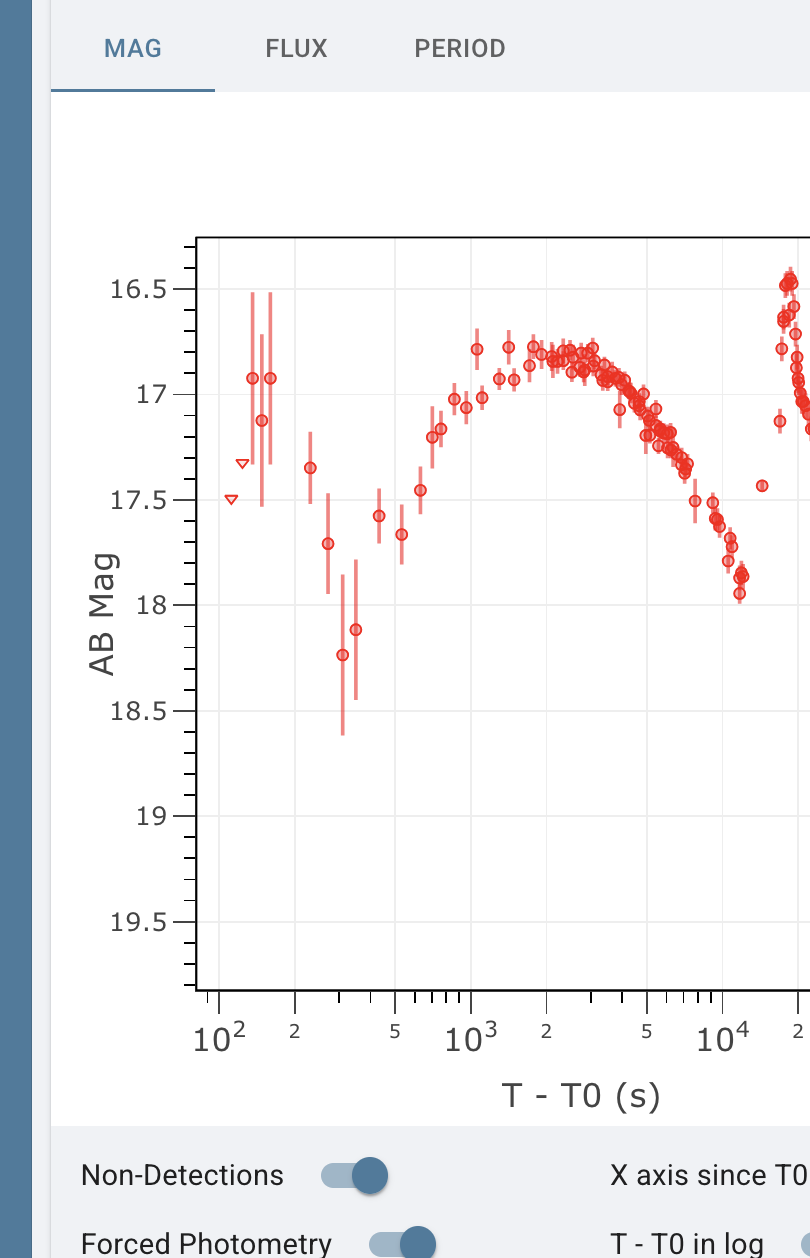
A non-linear (parabolic) color term was needed to adjust the early data, which was used to then fit both datasets from the TAROT-TCH and FRAM-Auger GRANDMA telescopes and obtain a color to convert both curves to the standard system, which was B-V = 1.46
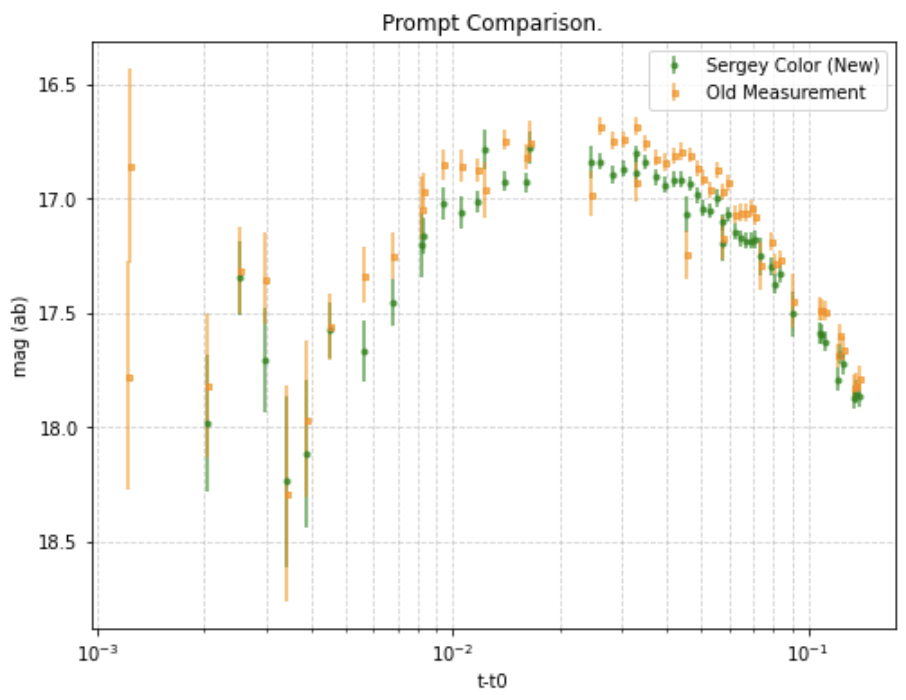
Utilizing the simultaneous multi-color data obtained from the Skynet telescopes, comprising observations in the B-, V-, R-, and I-
bands, we independently determined the transient’s early-time color. A color correction of B-V=0.4 was required to minimize the offsets introduced by the different filter responses, as the TAROT TCH data was obtained in a Clear filter, then converted to R band, which initially did not match the Johnson-Cousin R band of FRAM-Auger. As the color is parabolic, B-V = 0.4 also corrects the TAROT and FRAM data. We consider this to be the transient’s early-time color. Adjusted TAROT/FRAM data is now compatible:
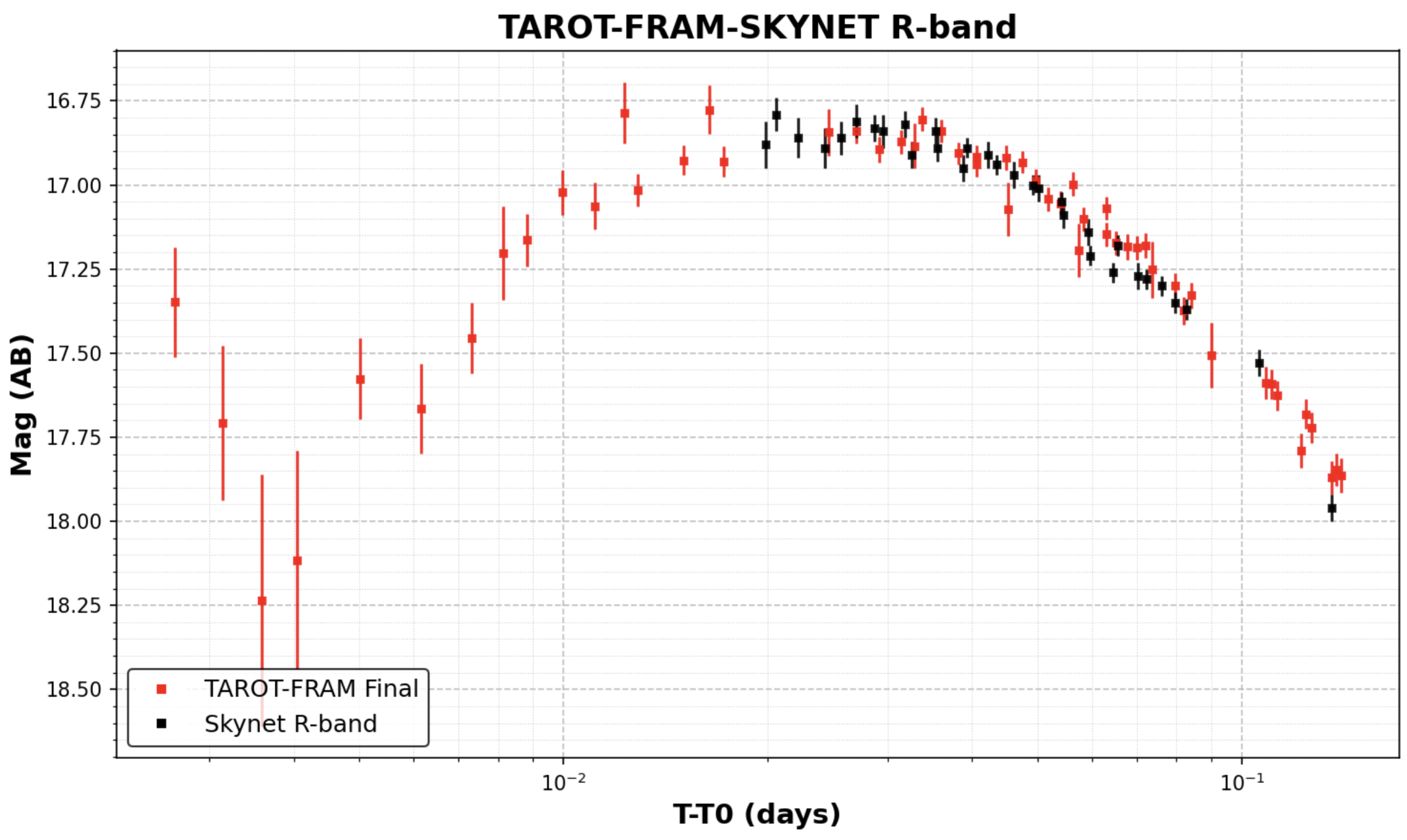
Skynet data was stacked to improve SNR and cadence, as seen compared with the individual frames.
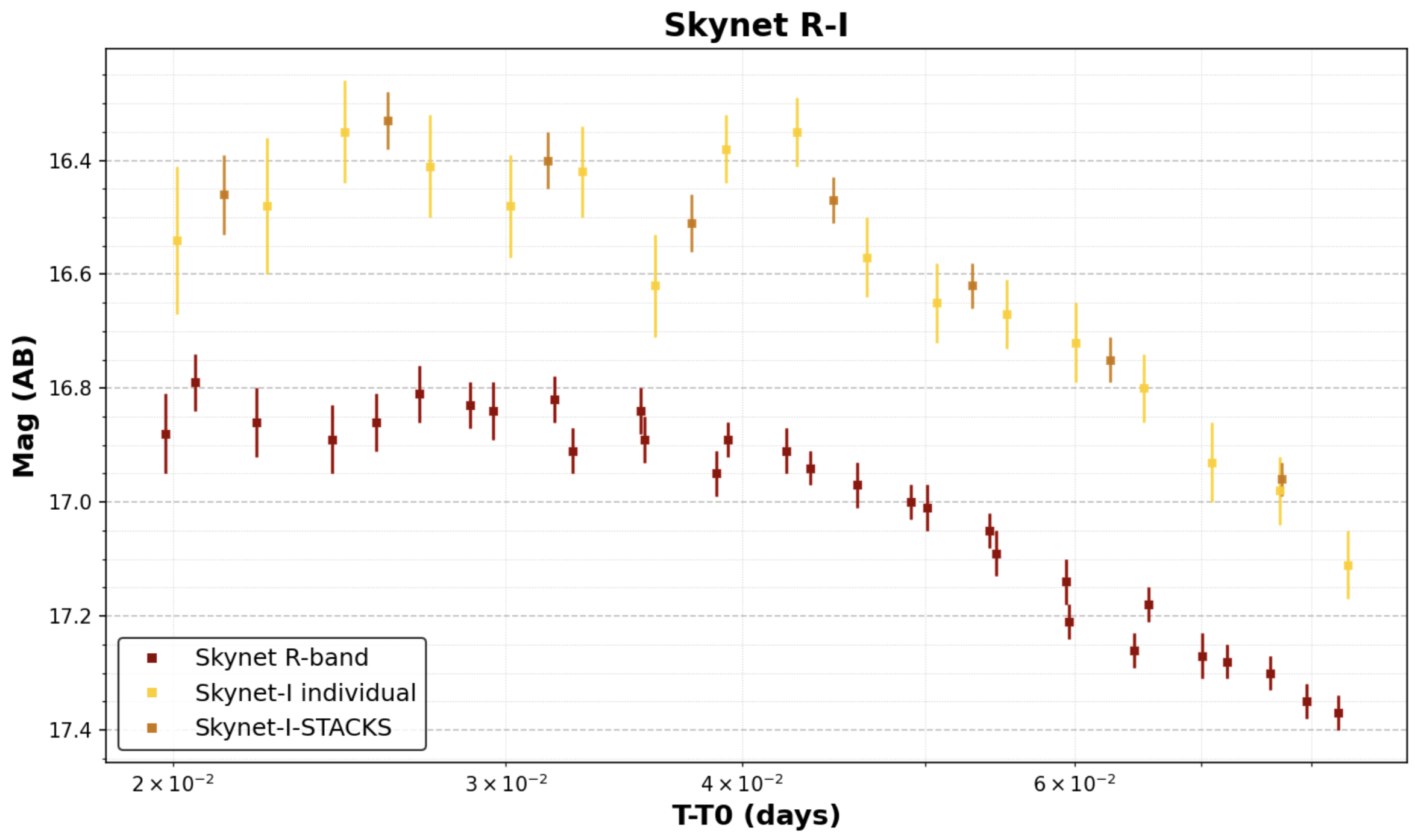
We keep the upper limit of TCH at the beginning since it corresponds to prompt (note that Alain provided measurements, but Sergey's double analysis didn't confirm it, so we prefer to keep it as an upper limit)
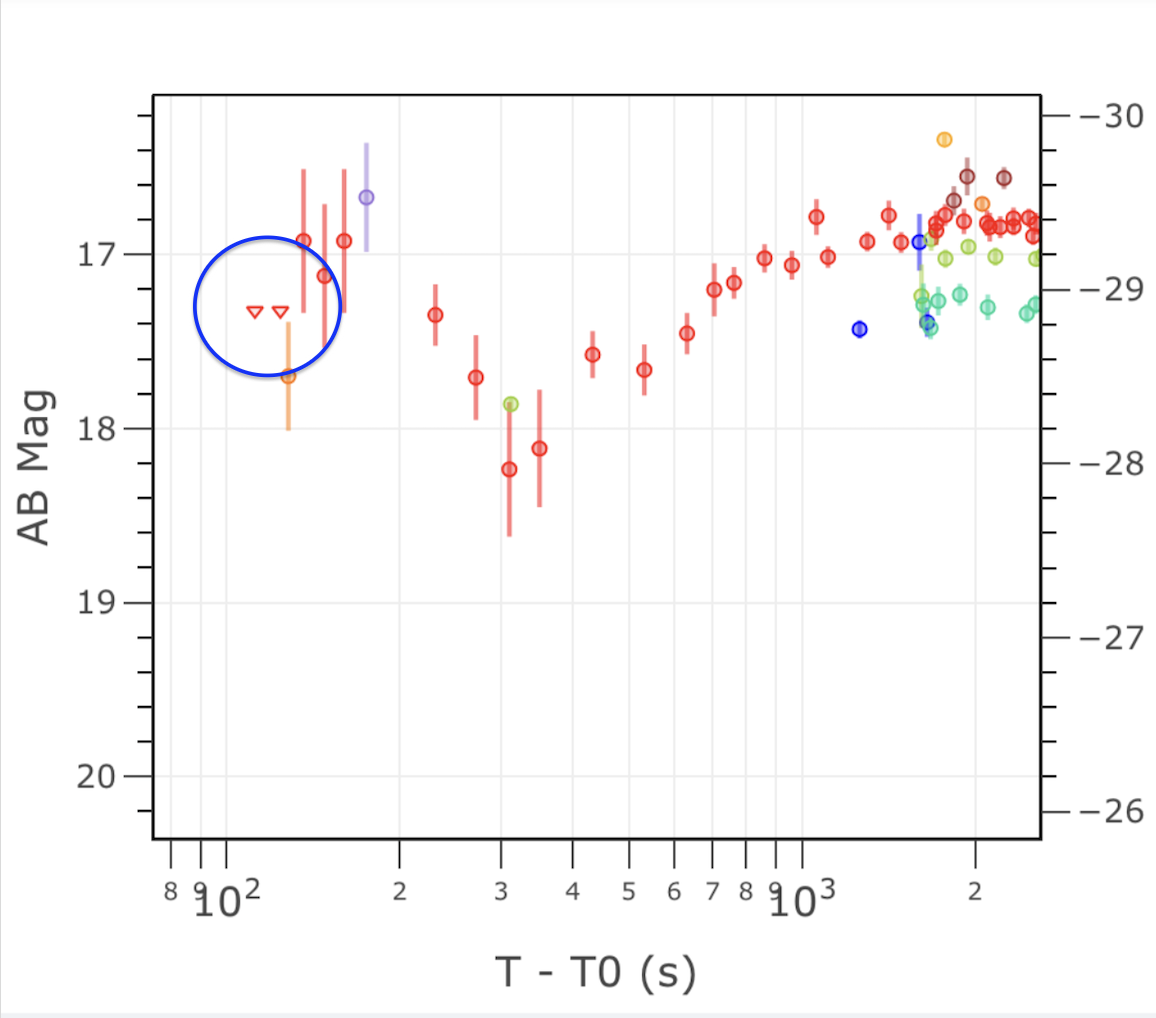
KAIT data was also clear, unfiltered data with poor background quality and high noise levels in certain images. No color term corrections were applied as their inclusion led to further instability in the fit. The background mesh size was reduced to 32 pixels, with a constant zero-point, and a reduced annulus size was constrained to apertures of 2 and 4 FWHM for the sky inner and outer annuli, respectively.
NOTE: a pre-analysis was performed by Alain Klotz; and Sarah on TCA and TCH data, and it was in agreement. TCA was not added as it represented no additional value and the data were worse than TCH.
At the time of the first flare, Skynet and KAIT are in agreement.
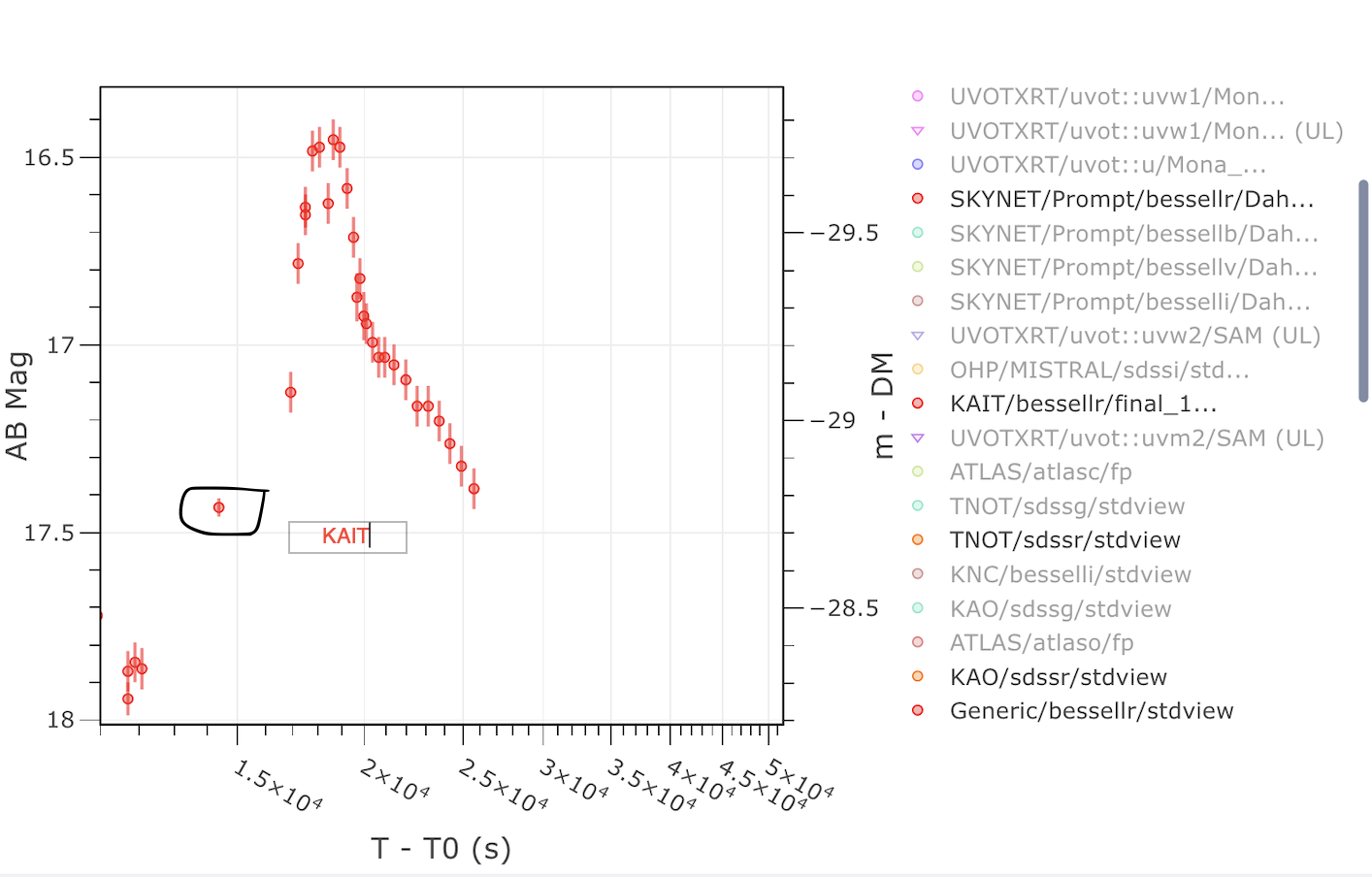
For PROMPT telescopes, we have various telescope: Skynet-PROMPT-MO, Skynet-MLC, Skynet-OUAU, Skynet-APUS, but it looks okay.
KAIT, TAROT, and FRAM were performed in a standard way by S. Karpov.
Johnson-B¶

Calibration:
- Catalog: Pan-STARRS DR1
- Magnitude System: Vega
Checks:
- [x] Target visible
- [x] PSF round
- [x] No stacking issues
- [x] SNR acceptable: 15 to 30
- [x] Color term applied: We applied a color correction of B-V=0.4
- [x] Force photometry: Only FP was used
- [] Template subtraction: No
- [] Cross-telescope agreement: Yes however a special treatment by S. Karpov was required--see below.
Comments:
The B-Band was only covered by two Skynet telescopes, the LC is consistent with another R-band of the same telescope, and TAROT and KAIT. Especially the rebrightening around 10^4 s post T0, 2.7 h post T0
A specific treatment was that the data had to be corrected using a B-V=0.4 color term to minimize the offsets introduced by the different filter responses of the various Skynet telescopes observing during this phase.
Due to the high SNR (> 15), the review of independent detection (e.g, with template/cross catalog) was not performed. The individual tasks are not accessible to Skyportal as it was uploaded by D. Akl in a single manner.
The reviewer didn't check the individual images visually. However, this was done by D. Akl prior to stacking.
Johnson-V¶
Calibration:
- Catalog: PS1
- Magnitude System: Vega
Checks:
- [x] Target visible
- [x] PSF round
- [x] No stacking issues
- [] SNR acceptable: 15 to 55
- [x] Color term applied: We applied a color correction of B-V= 0.4
- [x] Force photometry: Only FP was used
- [] Template subtraction: No
- [] Cross-telescope agreement: Only Skynet points remain. Amateur points excluded. See comments.
Comments:
Amateur data were removed in the g-band as they were not consistent with Skynet. We checked a stable star nearby and there was a 0.4 mag offset from Skynet to the amateurs. We measure a similar effect for different Skynet images and different periods. We conclude that it is due to detector efficiency and a filter that is not completely the same.
SDSS-r¶
Calibration:
- Catalog: PS1
- Magnitude System:
Checks:
- [x] Target visible
- [x] PSF round
- [x] No stacking issues
- [x] SNR acceptable :
- [x] Color term applied:
- [x] Force photometry: Yes
- [x] Template subtraction: Yes--with Legacy for COLIBRI
- [x] Cross-telescope agreement: Yes
Comments:
Removed one TNOT stdpipe 4075 as the upper limit did not provide anything.
Removed task 3944 amateur point, as we have a COLIBRI point just after, much better measured, and the error of the amateur point was around 0.2.
For task 3942, we chose image subtraction as it is more compatible.
Remove KNC task 4015 as the upper limit is too shallow.
Remove TNOT in 4076 as measurement 3h after is better and the source is not visible.
On task 4821, the subtraction and not subtracted provided a measurement difference of O.3, the non-subtraction is more compatible with the data.
After 2025-02-03T08:11:50, I move the COLIBRI measurement to 0.1.
COLIBRI data are in agreement with Francesco's one.

SDSS-i¶
Calibration:
- Catalog: PS1
- Magnitude System: AB
Checks:
- [x] Target visible : OHP; KAO, KNC
- [x] PSF round: For KNC, the target is "spread" among various pixels
- [x] No stacking issues
- [x] Only the source is taken in the aperture measurement
- [x] SNR acceptable: 4 to 36, the SNR is above > 8 for data before 2025-02-05
- [ ] Color term applied: For OHP/Mistral, the color is 0.15, otherwise < 0.05 generally
- [x] Force photometry: Yes
- [] Template subtraction with Legacy: Yes for KAO, OHP, KNC Euler
- [] Cross-telescope agreement: Yes for KAO, OHP, KNC (sometimes), Euler
Comments:
A)

In this image, we see the gap between KAO and KNC, which is confirmed by comparison with besselR, who see exactly the same trend at 80,000s post T0.
B) The OHP data on 25 01 29 is consistent with independent OHP measurements (from C. Adami) of i=16.3+/-0.02, despite a color term of 0.15.
C) The cross-matched detection for KNC http://grandma-stdpipe.ijclab.in2p3.fr/tasks/3902, is not "totally" focusing on the right aperture, but both force photometry and template provide the same measurement of 18.8 +/- 0.15.
D) I removed one amateur data point as it was taken 10 minutes after the first measurement (with a better SNR), and it didn't provide anything as it was taken longer.
E) 
The NAO point is not very consistent with the rest of the Euler data points, and the image presents artefacts. A careful look was asked of Sergey, see http://grandma-stdpipe.ijclab.in2p3.fr/tasks/4820 task. The results showed that the nearby star was taken in the aperture (inner circle), and a FMWH relative of 0.5 fixed the issue. We went to 21.0 +/- 0.05. Given the variability of the results, we took 21.3 +/- 0.1 (using Legacy)

Johnson-I¶
Calibration:
- Catalog: PS1 for SKYNET images + two KNC images are in GaîaDR3
- Magnitude System: Vega
Checks:
- [x] Target visible: OHP, KNC, Skynet
- [x] PSF round
- [x] No stacking issues: yes
- [x] Only the source is taken in the aperture measurement
- [x] SNR acceptable: 9 to 36
- [x] Color term applied: For SKYNET, the color is <0.1 and removed from the analysis; for KNC, it is 0.05 and 0.01
- [x] Force photometry: Yes
- [x] Template subtraction: Yes, with PS1 for KNC, it provides the same results as with force photometry
- [x] Cross-telescope agreement: Yes, but for task 3868, it is not detected
Comments:
The two KNC last points are calibrated with Gaîa and can't be compared with other data, in the i-band. They are taken about a few hours apart from each other at the time of a flare (see other bands). It is ok.

--------------
SDSS-z¶
Calibration:
- Catalog: PS1
- Magnitude System: AB
Checks:
- [x] Target visible: Artemis
- [x] PSF round
- [x] No stacking issues
- [x] Only the source is taken in the aperture measurement: Yes
- [x] SNR acceptable : > 5
- [x] Color term applied: Yes, 0.07
- [x] Force photometry: Yes
- [x] Template subtraction: Yes
- [x] Cross-telescope agreement: Yes
Comments:
A) For the last Artemis point, we set up a measurement compatible with force photometry and template subtraction.
B) We removed the KAO point upper limit as it didn't provide enough constraint (the image upper limit was at 17 mag).
uvot::v¶
Keep all stacked from Mona, time is consistent with SAM and detection as well
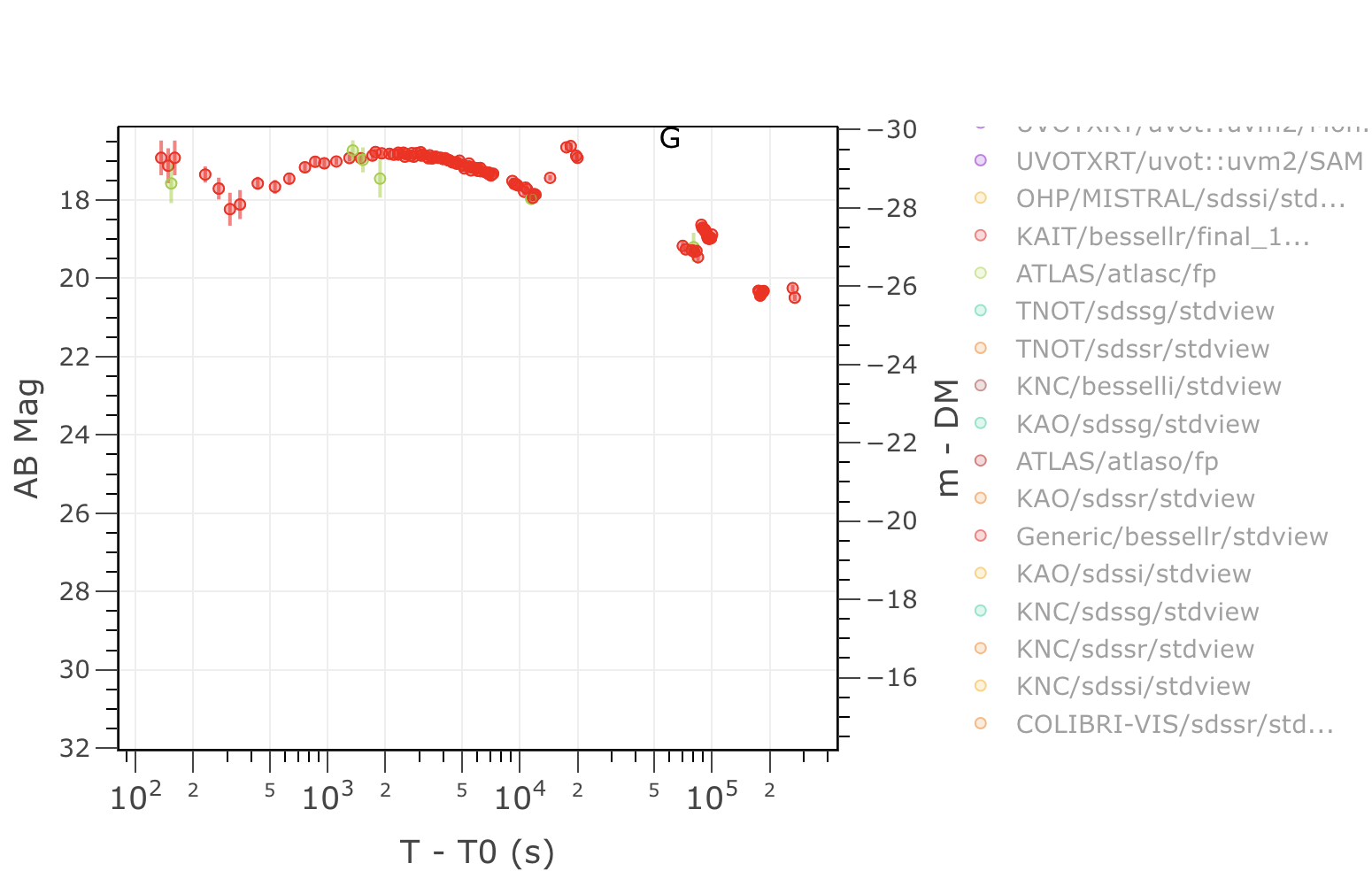
uvot::b¶
Excellent, all points are from Mona with SNR from 3.3 to 18.
The data were very consistent with Sam.
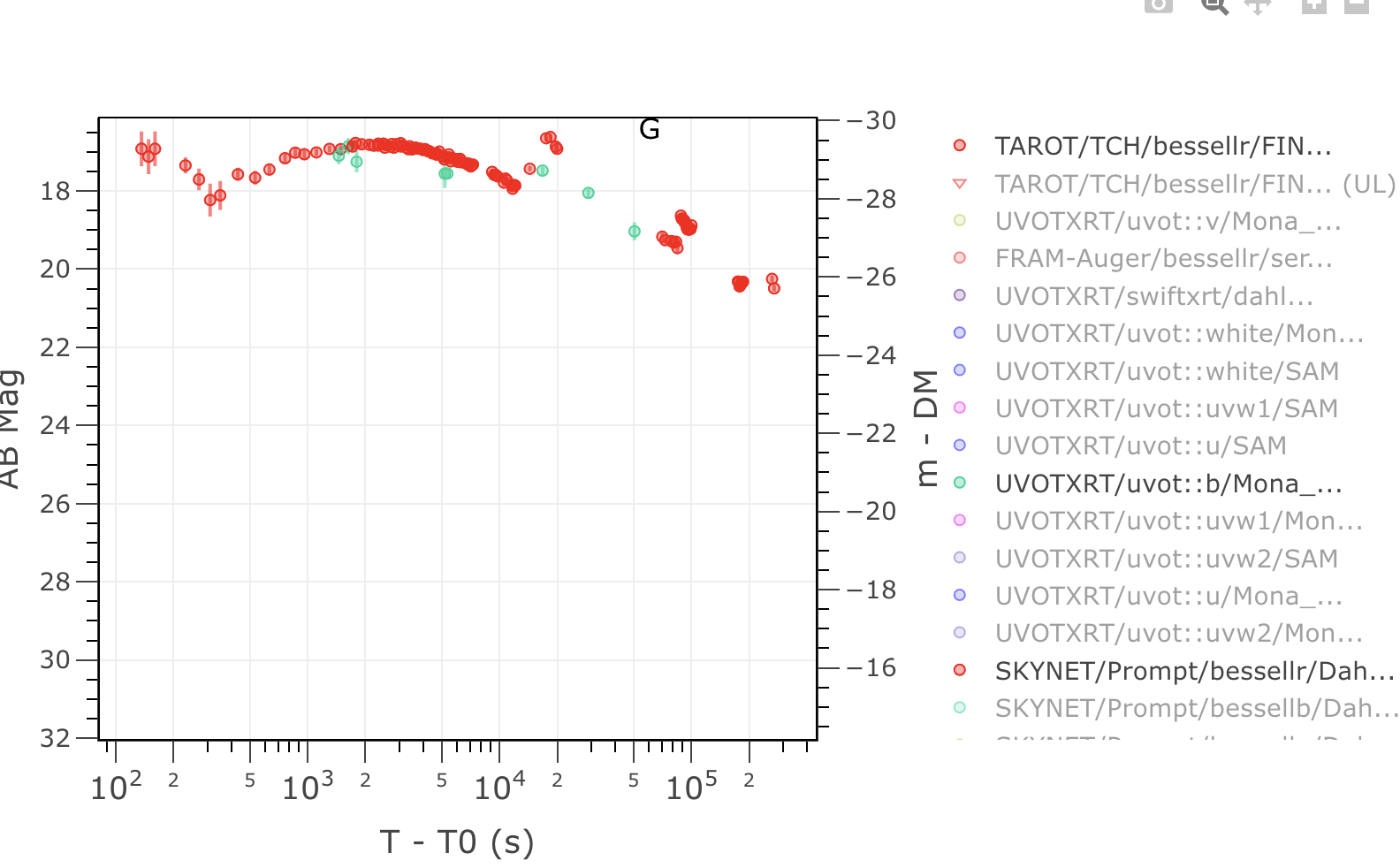
uvot::u¶
Agreement between Sam and Mona (two different approaches), one last SAM point remained, and fit the other data.
We can see a little "bump" at the end, but we are unsure if it is an artefact or not.
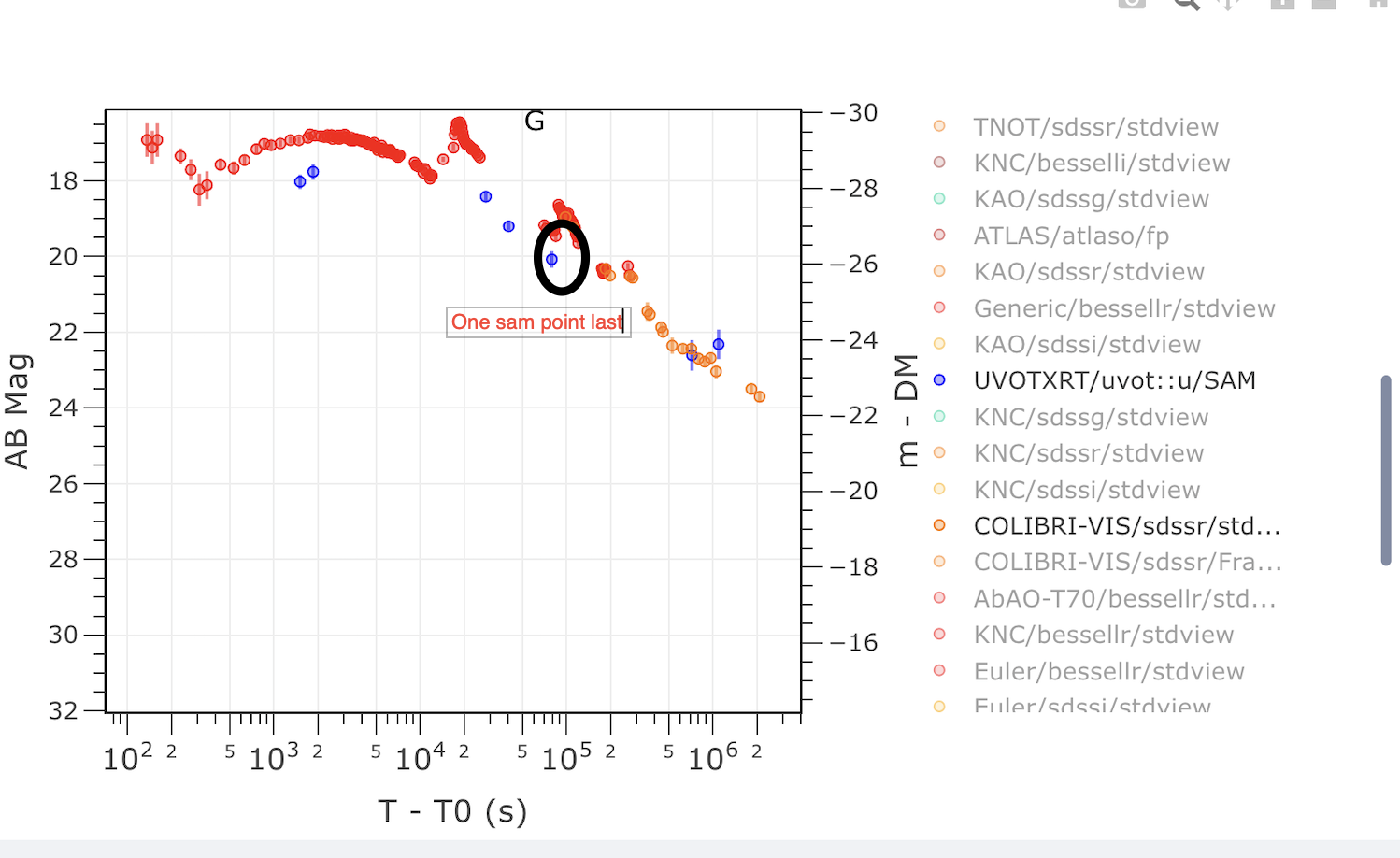
uvot::uvw1¶
4 detections and one upper limit, from Mona, compatible with Sam's results
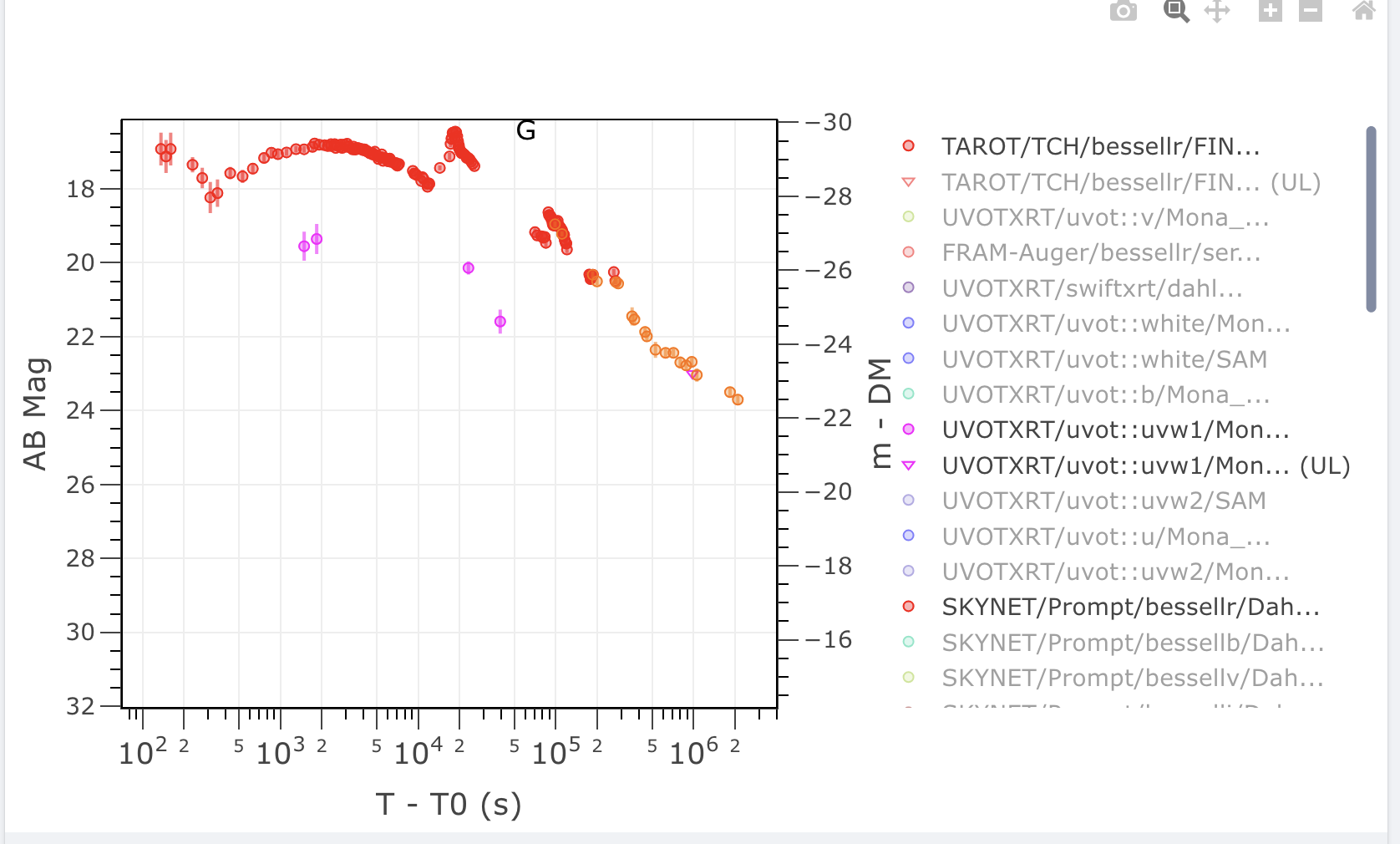
uvot::uvm2¶
One upper limit from Sam.
uvot::uvw2¶
One upper limit from Sam.
uvot::white¶
Consistent with Sam's results and r/R band light curve; I put one final point as an upper limit
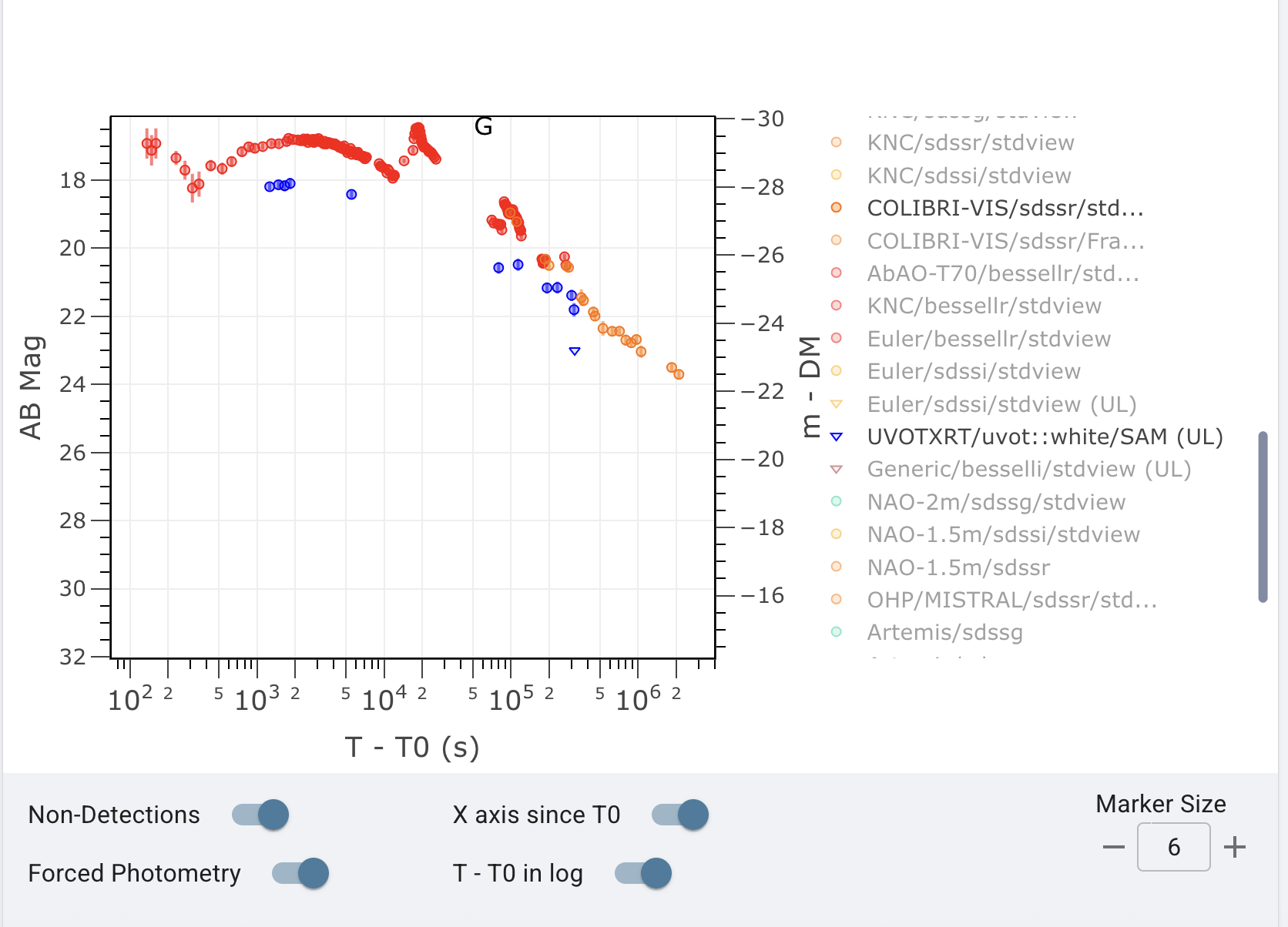
J-band¶
We will not use the J band observations in the D.A., but we will include both authors, and we will mention it.
The reason is that there is only one upper limit.
T1M : Observateurs F. Colas (LTE) et D. Darson (LPENS)
190.91h - 191.91h : mag > 19.5 ± 0.4 magJ (2MASS)
Ci-joint l'image FITS calibrée en astrométrie (je l'avais
déposée sur le site de Grandma).
Et le détail du calcul:
- Siris 120x30s = 1 heure de pose
- Le début de l' acquisition est a 3h40TU le 6/02 , fin de l'acquisition à 4h40TU
- mc_date2jd 2025-02-06T03:40:00 = 190.91h
- mc_date2jd 2025-02-06T04:40:00 = 191.91h
- L'étoile 2MASS J=13.973 f=1201596 => CJ = 13.973+2.5*log10(1201596) = 29.172
- Etoile faible f=16398
- Etoile la plus faible f=7318 => J = 29.172-2.5*log10(7318) = 19.5
Sachant que j'avais aussi analysé les trois images faites
avec la caméra Andor dans le visible:
- 168.40h - 168.45h : mag = 22.7 ± 0.3 magABg (SDSS DR12)
- 167.34h - 167.39h : mag = 22.9 ± 0.3 magABr (SDSS DR12)
- 189.24h - 190.28h : mag = 22.4 ± 0.2 magABr (SDSS DR12)
--------
EN:
Attached is the astrometrically calibrated FITS image (I uploaded it to Grandma's website).
And the calculation details:
Siris 120x30s = 1 hour exposure
Acquisition begins at 3:40 UT on February 6, and ends at 4:40 UT
mc_date2jd 2025-02-06T03:40:00 = 190.91h
mc_date2jd 2025-02-06T04:40:00 = 191.91h
Star 2MASS J = 13.973 f = 1201596 => CJ = 13.973 + 2.5 * log10 (1201596) = 29.172
Faint star f = 16398
Faintest star f = 7318 => J = 29.172 - 2.5 * log10 (7318) = 19.5
Knowing that I had also analyzed the three images taken
with the Andor camera in the visible range:
168.40h - 168.45h: mag = 22.7 ± 0.3 magABg (SDSS DR12)
167.34h - 167.39h: mag = 22.9 ± 0.3 magABr (SDSS DR12)
189.24h - 190.28h: mag = 22.4 ± 0.2 magABr (SDSS DR12)